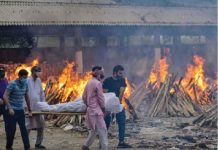
Sanjay Leela Bhansali’s Goliyon Ki Raasleela Ram-Leela is essentially two films mashed into one. The title, imposed on the film by the Madhya Pradesh High Court after the Bajrang Dal protested against their sentiments being hurt, neatly divides the film into two parts, which differ substantially on quality. When it comes to the scenes between the two protagonists, Ram (Ranveer Singh) and Leela (Deepika Padukone), there is a primal intensity, great sensuousness marking what is one of the most passionate romances seen on the Bollywood screen in recent times. But when you look at the rest of the film, the Goliyon Ki Raasleela if you will, it seems flabby, awkward and unlikely far beyond what our suspension of disbelief allows.
Ram and Leela, like Parma and Zoya in Ishaqzaade or Rahul and Bachchi in Issaq — to just mention the Romeo and Juliet adaptations by Bollywood this year — are star-crossed lovers from warring families, who have been raised to hate the other but through their love, try to bring the age-old feud to an end. (In Ram and Leela’s case, the families have actually been fighting since Shakespeare’s time.) They meet when Ram sneaks into Leela’s family’s Holi celebration, and before any sort of meaningful conversation, are sharing a passionate kiss, enjoying love at first sight. Despite their families’ objections, they continue the romance, mostly through text messages and the occasional musical number. All that’s fine, really; the chemistry that Singh and Padukone share is enough to paper over any cracks that show up so far.
Things take a drastic turn for the worse once Ram kills Leela’s brother after a shooting contest goes awry, Bhansali’s adaptation of Romeo’s duel with Tybalt. Up until now, the romance has been separate from the blood feud raging around them, an over-the-top conflict with little by way of real drama or logic. Once the two protagonists are involved in the war, they themselves lose what little reason they have and begin a bizarre sequence of events that had me looking for a blunt instrument to bang my head with. One moment, Leela accuses Ram of killing her brother. The next moment, they’re making out, all accusations forgotten. The two elope, but only to a small village a few kilometres away; it takes Ram’s friends all of one day to find them, and all of one night to trick them into coming home.
Once back — spoilers ahead, so you might want to skip this paragraph if you intend to watch this atrocity — the two are installed as the heads of their respective families. You’d think that means the two come together and end the feud, but that would mean they act out of logic. But no, Ram plays the pig-headed male and escalates the war. Leela, meanwhile, is carrying the torch but never actually tells Ram she’s doing so, even though they have friggin’ cellphones! Eventually, the proverbial hits the fan when a cousin of Leela’s cousin makes a power play and issues written orders in her name to kill Ram’s family (because obviously, you want to leave a paper trail of your mass murders). In the midst of the carnage, which no one really wants but is bound by the orders to condone, Ram and Leela meet again and decide the smartest thing for them to do is kill each other.
It’s not all bad; every other reviewer wouldn’t be raving about it otherwise. The songs, in particular, are well-composed and shot, even if we could have done without that “Look Ma, no dandruff!” step. Bhansali’s skills at creating a visual treat are at the fore, and he creates a backdrop that seems very authentic. More a pity, therefore, that he can’t create anything resembling authentic human beings.












